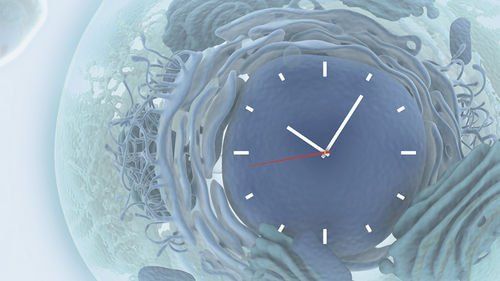This is an automatically translated article.
The human body's circadian clock, also known as circadian rhythm, can be hindered by many things such as getting too little daylight, consuming too much caffeine or neglecting regular exercise often. The following article will look at the best and easiest ways that you can "reset" your biological clock to ensure you have a good night's sleep.
1. Is it possible to reset the biological clock of the human body?
Physiological changes throughout the day are regulated by a biological system consisting of a "central clock" located deep in the center of the brain and many "clocks" located in different parts of the body body.
This study, published in the FASEB Journal (published by the Federation of American Societies for Experimental Biology), involved 16 healthy volunteers studied in temporary isolation chambers. These results show for the first time that the peripheral circadian clock located in leukemic cells can be synchronized through the administration of glucocorticoid tablets.
Humans are basically daytime creatures, staying up too much at night will significantly disrupt the body's biological clock. In the long run, they can lead to high rates of various health problems, such as metabolic, cardiovascular problems or even certain types of cancer.
"Problems with atypical work schedule adjustment are a big problem for society. Our previous studies clearly show that asynchronous circadian clocks disrupt sleep , performance, and cardiac parameters of night shift workers.However, current approaches to these problems have significant limitations, as a single therapy cannot address disruptions that occur. For example, when used improperly, light therapy can even aggravate the situation," said Dr. Diane B. Boivin, Director of the Center for Research and Development. Heartbeat Treatment, where the aforementioned study was conducted.
Mechanism:
We still do not fully understand the mechanism by which peripheral circadian clocks adapt to night shift work in humans but it is thought that these clocks are essentially clock dependent center.
"Clock genes are what governs our circadian clock, and these genes are active in all of our organs. Animal studies have shown that the central clock (in our brain) sends signals to the clocks in other organs.Glucocorticoids seem to play a central role, however, so far, no one has proven that cortisol (a glucocorticoid) plays a role this in humans," said Dr. Nicolas Dermakin, Director of the Laboratory of Molecular Biology.
"We studied the rhythmic expression of clock genes in white blood cells to see how they regulate in response to glucocorticoids. These cells are involved in our body's response first. attacks from many pathogens, therefore, this study suggests that circadian rhythms may play a role in immune control." Dr. Marc Cuesta, a postdoctoral fellow working in Dr. Boivin and Dr. Dermakin's lab adds to the immune function in night shift workers.
Previous work by Dr. Boivin and Dr. Her team has shown that exposing workers to bright light at night to adjust work schedules can improve the synchronization of the central biological clock with atypical work schedules. This new scientific discovery opens the door to innovative therapies that can act on different parts of the circadian system so that these rhythms can be regulated by inverted sleep schedules These studies are applicable to travelers, night shift workers, patients with sleep disorders and circadian rhythm disturbances, as well as people with various mental disorders. “At this stage, we do not recommend the use of glucocorticoids to correct the rhythms of those who work,” explains Boivin. night shift because of possible medical risks. However, these results lead us to believe that we may one day be able to use combination therapy that targets the central clock (reversing the work schedule, performing controlled light therapy). control) with pharmacological treatment targeting the peripheral clock to ensure that all clocks are regulated."

Thức đêm quá nhiều sẽ sẽ phá vỡ đáng kể đồng hồ sinh học trong cơ thể.
2. Understanding how the biological clock works
Each of us operates on a circadian schedule that determines when we feel tired and when we feel awake. When our sleep clock is working properly, it sends our bodies signals to sleep at night and wake up in the morning. However, sometimes this sleep clock can get out of sync making your usual schedule out of whack.
This can affect your overall sleep quality, making it difficult for you to fall asleep and wake up at the right time, ultimately causing you to lose sleep or be “antisocial” that can affect your sleep. affect performance and mood.
The term "sleep clock" refers to several biological mechanisms that control wakefulness and fatigue cycles, which are led by the hypothalamic super-neuronal nuclei (SCNs). This cycle is called the “circadian rhythm”. When functioning optimally, this rhythm means that you will fall asleep at about the same time each day and wake up in the morning at the same time each day.
Some people go to bed later or wake up earlier than others. To some extent, genetics influence sleep habits, but behavior and environment also play a role. Science doesn't understand everything yet, but basically, the body's internal clock is influenced by a combination of external cues (like sunrise/set and temperature) as well as internal cues. (such as hormones, neurotransmitters, and genes) and behaviors (such as delayed sleep or activity levels).
3. 5 ways to reset the body clock
3.1. Exposure to lightResearch shows that manipulating light exposure can help reset the body clock, especially for jet-induced disorders. Light remains a focus of researchers and is often the key to treatment for sleep-phase disorders.
The daily cycles of light and dark are a "zeitgeber" or primary signal that acts on the mechanisms of your sleep clock and circadian rhythm. The retinal ganglion cells in your eye detect light cycles and transmit the information to your SCN. In the presence of light, the SCN stimulates the pineal gland to produce melatonin (the sleep hormone). When melatonin levels are high (in low light conditions), you become drowsy and fall asleep. When your body senses light again, it stops producing melatonin to wake you up.
This basically means that you should obey the natural signals of the earth. Expose yourself to natural sunlight and bright light in the morning and throughout the day. Start dimming the lights in the evening when the sun goes down, keep the bedroom dark when you go to bed and do not expose to any electronic devices.
Some suggestions for you:
Exposure to the morning light: You can incorporate the yoga practice known as 'Surya namaskar' which basically translates as 'Salute to the sun' into your morning routine. . Or at the very least, try to let the sun's rays hit your room every morning. If your windows face North or if you live far from the equator, turn on high-brightness lights. Avoid screens: Our devices also emit light, but this type of light can do more harm than good. Blue-spectrum light from screens can affect your sleep by inhibiting melatonin production. In addition, it makes your eyes tired, which can lead to headaches. Create a dark environment: While sunlight wakes you up, light in the dark can keep you awake. So, if you live in areas with high light pollution, install blackout curtains or use a good sleep mask.

Ánh sáng quang phổ xanh từ màn hình có thể ảnh hưởng đến giấc ngủ của bạn bằng cách ức chế sản xuất melatonin
3.2. Adjust your meal times
Digestion and metabolism also play a role in alertness and sleepiness. When you eat, and to some extent, what you eat, can help you reset your sleep clock.
Harvard researchers found that, in animals, circadian rhythms change to match the availability of food. The researchers suggest that fasting for about 16 hours (e.g. during a flight) could help reset people's sleep clocks and reduce jet lag when traveling across time zones.
For other sleep clock disturbances, you can also try eating dinner early (around 5pm) and then, avoiding eating until breakfast time (8am) the next morning.
Once your sleep is back on track, stick to regular breakfast and dinner times to help support a steady circadian rhythm, with about 12 hours between breakfast and dinner. Eat dinner at least a few hours before you go to bed and eat a full breakfast as soon as you wake up.
Some studies also show that saturated fat in meat and dairy may not be good when eaten near bedtime, so you should eat lighter dinners and eat heavier meals during the day. better.
3.3. Go camping
Since a natural light schedule helps support the body's circadian rhythm, spending more time outdoors can help restore natural cycles. If you have some free time and enjoy seeing some breathtaking scenery, you can try another way to reset your biological clock, which is camping. Along with that are a few conditions attached:
No presence of computers and other types of screens. Exposure to natural sunlight during the day. Moderate to high physical activity. The fresh air and landscape will please your eyes and give your nervous system a rest. In fact, camping for just one weekend can reset your body clock and balance melatonin production. This means that once you return to your normal life, you will be able to fall asleep and wake up to your body's rhythm.
Cardiac arrhythmias contribute to a wide range of diseases; including obesity, diabetes, kidney problems, and the possibility of heart disease. Therefore, resetting the watch in a natural environment can help you a lot.
3.4. Re-establish a bedtime routine
One approach to temporarily reversing the retrograde sleep time is to stay awake one day until the next normal bedtime. This method is essentially planned insomnia, so it's best to do it under the supervision of a doctor.
There isn't much research specific to this method beyond the anecdotal literature on correcting sleep clock problems but it is a clinical part of chronotherapy and has been studied to treat treat depression.
If you went to bed at 4 a.m. and woke up at noon, you would wake up at your normal time (perhaps on a Friday), then, don't go back to sleep until (perhaps) 10 p.m. the next day later (Saturday). Gentle activity can help with staying awake.
Be aware, you will feel tired and never drive or do any other dangerous work without sleep.
What you need:
Change your bedtime: If you're going to sleep past midnight, try to get your period back to normal by stepping back 30 minutes every 2-3 days. This usually works well if you need to move your sleep schedule within 2-3 hours. Stick to your bedtime: Once your sleep schedule has returned to normal, stick to it and monitor it continuously. Additionally, you may want to track your sleep over a period of time to determine your sleep needs, typically 7-9 hours for adults, and build your daily regimen around those needs. this bridge. Avoid staying in bed for too long: You feel the urge to stay in bed longer, especially on weekends or after a night out. The point is that even one sleepless night or irregular sleep can affect you for the next few days. So, if possible, try to avoid this scenario. Alternatively, you may want to do a relaxing activity before bed like: Taking a hot bath, drinking tea, reading a book, or whatever makes you happy will create positive associations in the brain and thus That helps you fall asleep faster.

Trước khi đi ngủ, hãy thực hiện bất kỳ một hoạt động nào đó khiến bạn hạnh phúc để đi vào giấc ngủ nhanh hơn.
3.5. Take the steps gradually
For many people, slow and gradual change is best when it comes to long-term results. Small changes can also be easier on you physically and mentally, especially if you don't have days to recover from a lack of sleep.
Adjust your schedule to no more than 30 minutes a day and stay at each stage until your body catches up with the changes. Once you've fallen asleep and woken up at ideal times, don't forget to maintain a consistent schedule every day of the week.
Example: If your sleep clock is running two hours late, this is a potential plan to get back on track within a month. Each week, set a bedtime and wake-up time 15 minutes earlier on Sunday nights, then set it again on Wednesdays. After four weeks, you'll be on the right track.
For major delays, it may be more helpful to push your bedtime schedule one to two hours ahead until you go to bed normally. If your sleep clock is delayed by several hours and gradual steps don't cut it, your doctor or therapist can plan a combination chronotherapy approach for your situation.
4. Tips for healthy sleep
Don't forget to follow essential sleep hygiene guidelines during and after resetting your sleep clock.
Be persistent with your plan. Go to bed early enough to make sure you get the recommended amount of sleep (the CDC says adults need 7 to 9 hours of sleep). Maintain a consistent and strict sleep schedule — go to bed and wake up at the same time every day (even on weekends). Don't nap for longer than 20-30 minutes. Limit caffeine after lunch. Make it a habit to relax before going to bed. Avoid electronics, bright lights, and stress in the hours before bed. Keep your bedroom quiet, dark and cool. Don't stress about not sleeping - think positively. If improving sleep hygiene isn't helping or your sleep schedule is affecting your daily life, you can contact your doctor or sleep specialists. They will be able to help you set up a plan, recommend supplements, and diagnose any sleep disorders or underlying conditions to help you fix your sleep cycle. Please follow the website: Vinmec.com regularly to update many other useful information.
Please dial HOTLINE for more information or register for an appointment HERE. Download MyVinmec app to make appointments faster and to manage your bookings easily.
Reference articles: sciencedaily.com, amerisleep.com, technology.org, webmd.com, health.harvard.edu













